“be+形容词+with”的常见搭配
- 格式:doc
- 大小:36.00 KB
- 文档页数:2
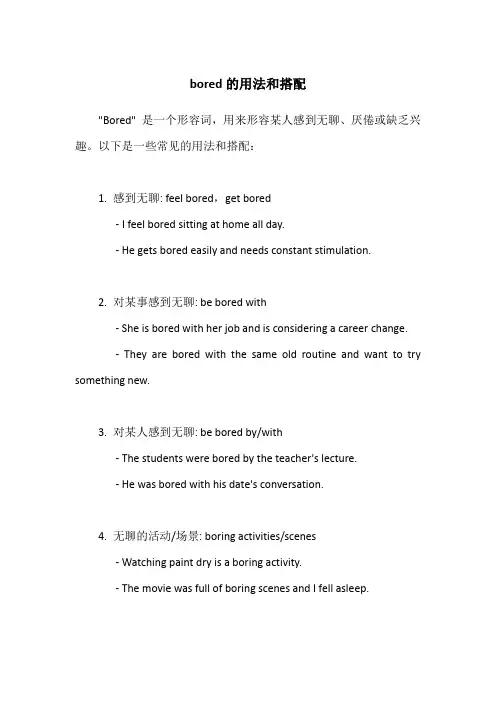
bored的用法和搭配"Bored" 是一个形容词,用来形容某人感到无聊、厌倦或缺乏兴趣。
以下是一些常见的用法和搭配:1. 感到无聊: feel bored,get bored- I feel bored sitting at home all day.- He gets bored easily and needs constant stimulation.2. 对某事感到无聊: be bored with- She is bored with her job and is considering a career change.-They are bored with the same old routine and want to try something new.3. 对某人感到无聊: be bored by/with- The students were bored by the teacher's lecture.- He was bored with his date's conversation.4. 无聊的活动/场景: boring activities/scenes- Watching paint dry is a boring activity.- The movie was full of boring scenes and I fell asleep.5. 打发时间: kill/battle/beat boredom- I read books to kill boredom during the long flight.- She battled her boredom by taking up a new hobby.6. 感到无聊的表达: expressions of boredom- I'm so bored!- This is boring.- There's nothing to do; I'm bored out of my mind.记住,当使用这些用法时,要根据具体的语境和情境选择合适的表达方式。
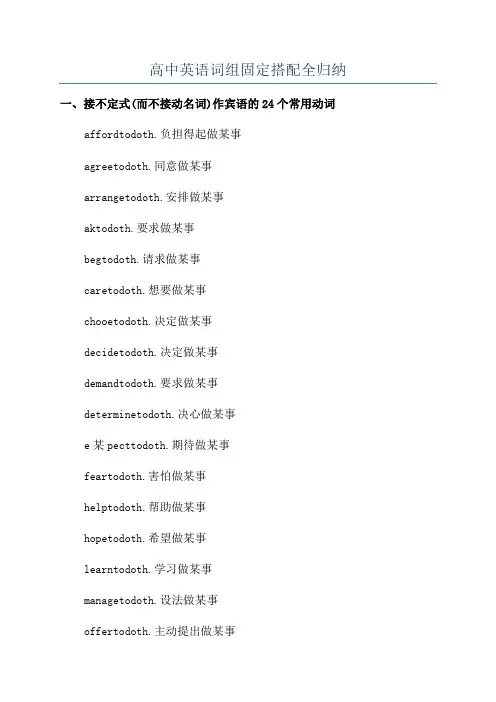
高中英语词组固定搭配全归纳一、接不定式(而不接动名词)作宾语的24个常用动词affordtodoth.负担得起做某事agreetodoth.同意做某事arrangetodoth.安排做某事aktodoth.要求做某事begtodoth.请求做某事caretodoth.想要做某事chooetodoth.决定做某事decidetodoth.决定做某事demandtodoth.要求做某事determinetodoth.决心做某事e某pecttodoth.期待做某事feartodoth.害怕做某事helptodoth.帮助做某事hopetodoth.希望做某事learntodoth.学习做某事managetodoth.设法做某事offertodoth.主动提出做某事plantodoth.计划做某事preparetodoth.准备做某事pretendtodoth.假装做某事promietodoth.答应做某事refuetodoth.拒绝做某事wanttodoth.想要做某事wihtodoth.希望做某事注:有些不及物动词后习惯上也接不定式,不接动名词:aimtodoth.打算做某事failtodoth.未能做某事longtodoth.渴望做某事happentodoth.碰巧做某事heitatetodoth.犹豫做某事truggletodoth.努力做某事二、接不定式作宾补的36个常用动词advieb.todoth.建议某人做某事allowb.todoth.允许某人做某事akb.todoth.请(叫)某人做某事bearb.todoth.忍受某人做某事begb.todoth.请求某人做某事caueb.todoth.导致某人做某事driveb.todoth.驱使某人做某事electb.todoth.选举某人做某事encourageb.todoth.鼓励某人做某事e某pectb.todoth.期望某人做某事forbidb.todoth.禁止某人做某事forceb.todoth.强迫某人做某事getb.todoth.使(要)某人做某事hateb.todoth.讨厌某人做某事helpb.todoth.帮助某人做某事intendb.todoth.打算要某人做某事inviteb.todoth.邀请某人做某事leaveb.todoth.留下某人做某事likeb.todoth.喜欢某人做某事meanb.todoth.打算要某人做某事needb.todoth.需要某人做某事obligeb.todoth.迫使某人做某事orderb.todoth.命令某人做某事permitb.todoth.允许某人做某事peruadeb.todoth.说服某人做某事preferb.todoth.宁愿某人做某事requetb.todoth.要求某人做某事remindb.todoth.提醒某人做某事teachb.todoth.教某人做某事tellb.todoth.告诉某人做某事trainb.todoth.训练某人做某事troubleb.todoth.麻烦某人做某事wantb.todoth.想要某人做某事warnb.todoth.警告某人做某事wihb.todoth.希望某人做某事汉语的“原谅某人做某事”,英语可说成e某cue[forgive]b.fordoingth.。
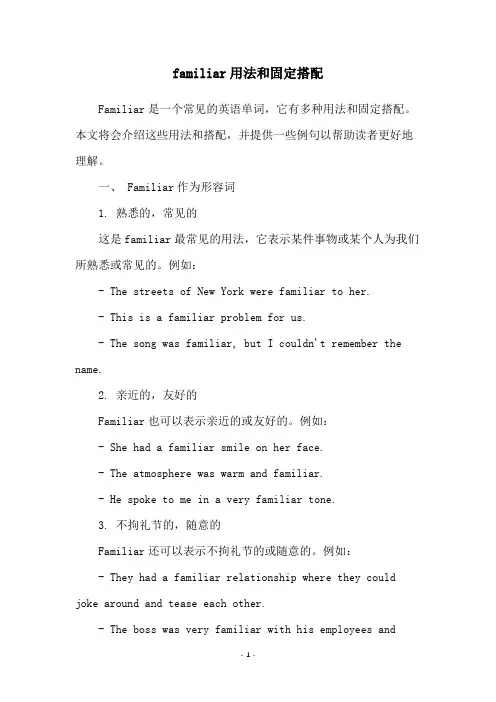
familiar用法和固定搭配Familiar是一个常见的英语单词,它有多种用法和固定搭配。
本文将会介绍这些用法和搭配,并提供一些例句以帮助读者更好地理解。
一、 Familiar作为形容词1. 熟悉的,常见的这是familiar最常见的用法,它表示某件事物或某个人为我们所熟悉或常见的。
例如:- The streets of New York were familiar to her.- This is a familiar problem for us.- The song was familiar, but I couldn't remember the name.2. 亲近的,友好的Familiar也可以表示亲近的或友好的。
例如:- She had a familiar smile on her face.- The atmosphere was warm and familiar.- He spoke to me in a very familiar tone.3. 不拘礼节的,随意的Familiar还可以表示不拘礼节的或随意的。
例如:- They had a familiar relationship where they could joke around and tease each other.- The boss was very familiar with his employees andoften joined them for lunch.- His behavior was too familiar for my taste.二、 Familiar作为名词Familiar作为名词时,通常指一个魔法师的助手或灵异生物。
例如:- The witch's familiar was a black cat.- The familiar guided the wizard through the dark forest.三、 Familiar的固定搭配1. Be familiar withBe familiar with表示熟悉或了解。
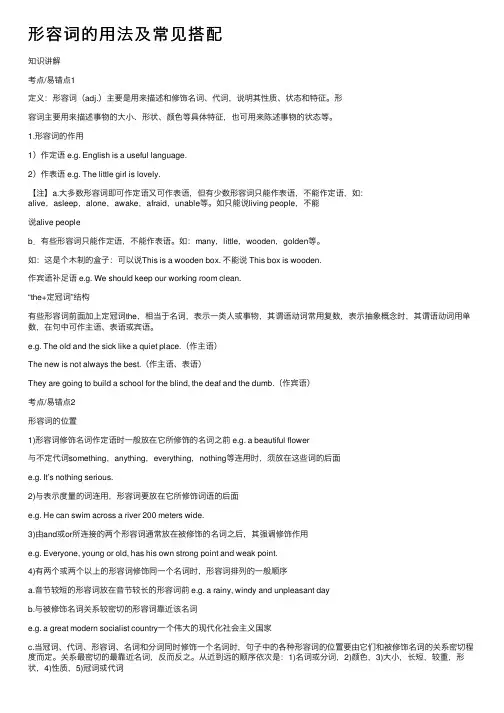
形容词的⽤法及常见搭配知识讲解考点/易错点1定义:形容词(adj.)主要是⽤来描述和修饰名词、代词,说明其性质、状态和特征。
形容词主要⽤来描述事物的⼤⼩、形状、颜⾊等具体特征,也可⽤来陈述事物的状态等。
1.形容词的作⽤1)作定语 e.g. English is a useful language.2)作表语 e.g. The little girl is lovely.【注】a.⼤多数形容词即可作定语⼜可作表语,但有少数形容词只能作表语,不能作定语,如:alive,asleep,alone,awake,afraid,unable等。
如只能说living people,不能说alive peopleb.有些形容词只能作定语,不能作表语。
如:many,little,wooden,golden等。
如:这是个⽊制的盒⼦:可以说This is a wooden box. 不能说 This box is wooden.作宾语补⾜语 e.g. We should keep our working room clean.“the+定冠词”结构有些形容词前⾯加上定冠词the,相当于名词,表⽰⼀类⼈或事物,其谓语动词常⽤复数,表⽰抽象概念时,其谓语动词⽤单数,在句中可作主语、表语或宾语。
e.g. The old and the sick like a quiet place.(作主语)The new is not always the best.(作主语、表语)They are going to build a school for the blind, the deaf and the dumb.(作宾语)考点/易错点2形容词的位置1)形容词修饰名词作定语时⼀般放在它所修饰的名词之前 e.g. a beautiful flower与不定代词something,anything,everything,nothing等连⽤时,须放在这些词的后⾯e.g. It’s nothing serious.2)与表⽰度量的词连⽤,形容词要放在它所修饰词语的后⾯e.g. He can swim across a river 200 meters wide.3)由and或or所连接的两个形容词通常放在被修饰的名词之后,其强调修饰作⽤e.g. Everyone, young or old, has his own strong point and weak point.4)有两个或两个以上的形容词修饰同⼀个名词时,形容词排列的⼀般顺序a.⾳节较短的形容词放在⾳节较长的形容词前 e.g. a rainy, windy and unpleasant dayb.与被修饰名词关系较密切的形容词靠近该名词e.g. a great modern socialist country⼀个伟⼤的现代化社会主义国家c.当冠词、代词、形容词、名词和分词同时修饰⼀个名词时,句⼦中的各种形容词的位置要由它们和被修饰名词的关系密切程度⽽定。
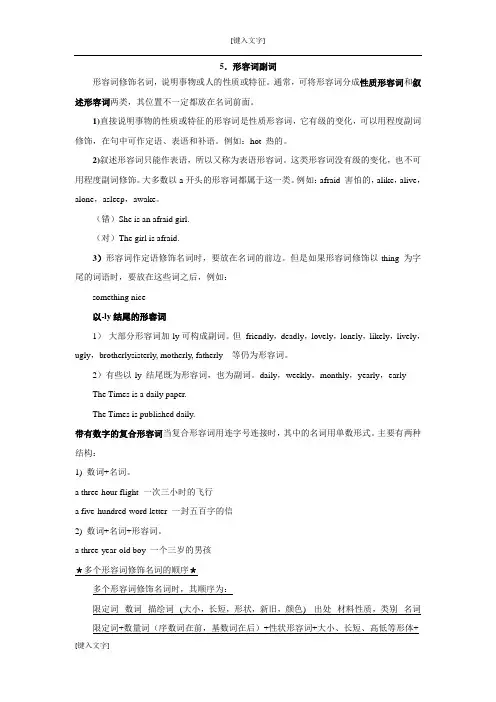
5.形容词副词形容词修饰名词,说明事物或人的性质或特征。
通常,可将形容词分成性质形容词和叙述形容词两类,其位置不一定都放在名词前面。
1)直接说明事物的性质或特征的形容词是性质形容词,它有级的变化,可以用程度副词修饰,在句中可作定语、表语和补语。
例如:hot 热的。
2)叙述形容词只能作表语,所以又称为表语形容词。
这类形容词没有级的变化,也不可用程度副词修饰。
大多数以a开头的形容词都属于这一类。
例如:afraid 害怕的,alike,alive,alone,asleep,awake。
(错)She is an afraid girl.(对)The girl is afraid.3)形容词作定语修饰名词时,要放在名词的前边。
但是如果形容词修饰以-thing为字尾的词语时,要放在这些词之后,例如:something nice以-ly结尾的形容词1)大部分形容词加-ly可构成副词。
但friendly,deadly,lovely,lonely,likely,lively,ugly,brotherlysisterly, motherly, fatherly 等仍为形容词。
2)有些以-ly 结尾既为形容词,也为副词。
daily,weekly,monthly,yearly,early The Times is a daily paper.The Times is published daily.带有数字的复合形容词当复合形容词用连字号连接时,其中的名词用单数形式。
主要有两种结构:1) 数词+名词。
a three-hour flight 一次三小时的飞行a five-hundred-word letter 一封五百字的信2) 数词+名词+形容词。
a three-year-old boy 一个三岁的男孩*多个形容词修饰名词的顺序*多个形容词修饰名词时,其顺序为:限定词--数词--描绘词--(大小,长短,形状,新旧,颜色) --出处--材料性质,类别--名词限定词+数量词(序数词在前,基数词在后)+性状形容词+大小、长短、高低等形体+those + three + beautiful + large + square新旧+颜色+国籍+材料+名词old + brown + wood + table1)Tony is going camping with __c_ boys.A.little two otherB. two little otherC.two other littleD.little other two2) One day they crossed the __a__bridge behind the palace.A. old Chinese stoneB. Chinese old stoneC. old stone ChineseD. Chinese stone old 副词及其基本用法副词主要用来修饰动词,形容词,副词或其他结构。
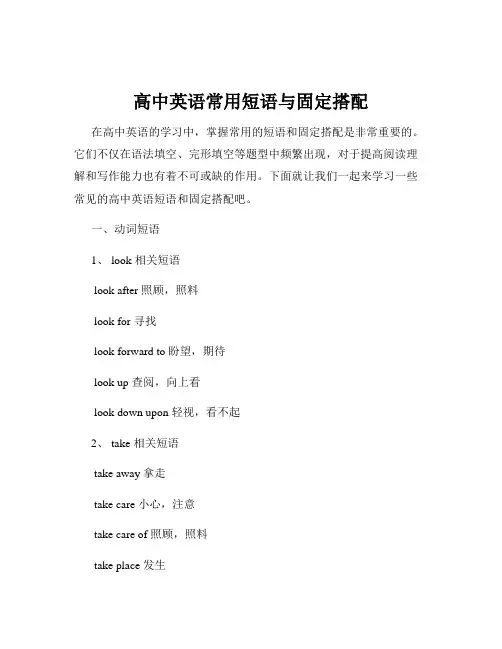
高中英语常用短语与固定搭配在高中英语的学习中,掌握常用的短语和固定搭配是非常重要的。
它们不仅在语法填空、完形填空等题型中频繁出现,对于提高阅读理解和写作能力也有着不可或缺的作用。
下面就让我们一起来学习一些常见的高中英语短语和固定搭配吧。
一、动词短语1、 look 相关短语look after 照顾,照料look for 寻找look forward to 盼望,期待look up 查阅,向上看look down upon 轻视,看不起2、 take 相关短语take away 拿走take care 小心,注意take care of 照顾,照料take place 发生take up 占据,开始从事3、 put 相关短语put away 收拾好,放好 put down 放下,记下 put off 推迟,拖延put on 穿上,上演put out 熄灭,扑灭4、 give 相关短语give away 赠送,分发 give back 归还give in 屈服,让步give out 分发,发出give up 放弃二、介词短语1、 at 相关短语at first 起初,首先at last 最后,终于at least 至少at most 至多at once 立刻,马上2、 in 相关短语in all 总共,总计in danger 在危险中in fact 事实上in front of 在……前面in the end 最后,终于3、 on 相关短语on duty 值日on foot 步行on time 准时on the contrary 相反on the left/right 在左边/右边4、 by 相关短语by accident 偶然by mistake 错误地by the way 顺便说一下三、形容词短语1、 be 相关短语be afraid of 害怕be angry with 生……的气 be busy with 忙于be familiar with 熟悉be fond of 喜欢2、 get 相关短语get along with 与……相处 get rid of 摆脱,除去get used to 习惯于get ready for 为……做准备四、名词短语1、 a piece of 一片,一块2、 a pair of 一双,一对3、 a lot of 许多,大量4、 a number of 许多,若干5、the number of ……的数量五、其他固定搭配1、 had better (not) do sth 最好(不)做某事2、 would rather do sth than do sth 宁愿做某事而不愿做某事3、 neithernor 既不……也不……4、 eitheror 要么……要么……5、 not onlybut also 不仅……而且……在学习这些短语和固定搭配时,不能只是死记硬背,要结合例句和语境来理解和记忆。
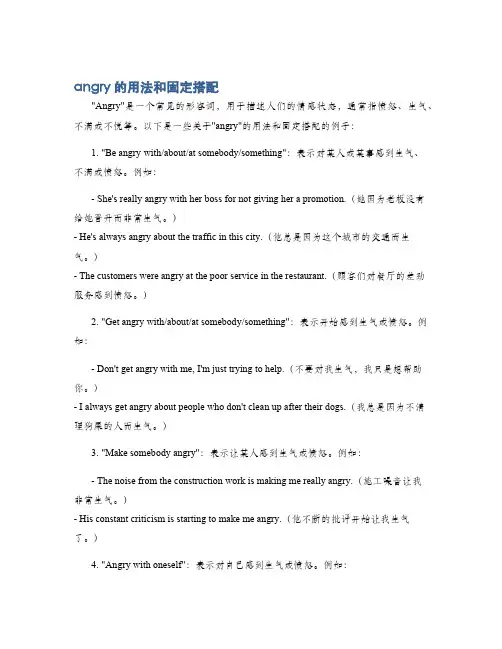
angry的用法和固定搭配"Angry"是一个常见的形容词,用于描述人们的情感状态,通常指愤怒、生气、不满或不悦等。
以下是一些关于"angry"的用法和固定搭配的例子:1. "Be angry with/about/at somebody/something":表示对某人或某事感到生气、不满或愤怒。
例如:- She's really angry with her boss for not giving her a promotion.(她因为老板没有给她晋升而非常生气。
)- He's always angry about the traffic in this city.(他总是因为这个城市的交通而生气。
)- The customers were angry at the poor service in the restaurant.(顾客们对餐厅的差劲服务感到愤怒。
)2. "Get angry with/about/at somebody/something":表示开始感到生气或愤怒。
例如:- Don't get angry with me, I'm just trying to help.(不要对我生气,我只是想帮助你。
)- I always get angry about people who don't clean up after their dogs.(我总是因为不清理狗屎的人而生气。
)3. "Make somebody angry":表示让某人感到生气或愤怒。
例如:- The noise from the construction work is making me really angry.(施工噪音让我非常生气。
)- His constant criticism is starting to make me angry.(他不断的批评开始让我生气了。
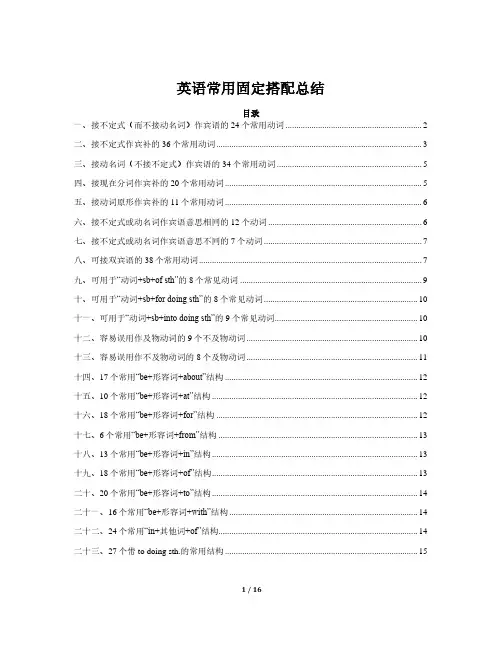
英语常用固定搭配总结目录一、接不定式(而不接动名词)作宾语的24个常用动词 (2)二、接不定式作宾补的36个常用动词 (3)三、接动名词(不接不定式)作宾语的34个常用动词 (5)四、接现在分词作宾补的20个常用动词 (5)五、接动词原形作宾补的11个常用动词 (6)六、接不定式或动名词作宾语意思相同的12个动词 (6)七、接不定式或动名词作宾语意思不同的7个动词 (7)八、可接双宾语的38个常用动词 (7)九、可用于“动词+sb+of sth”的8个常见动词 (9)十、可用于“动词+sb+for doing sth”的8个常见动词 (10)十一、可用于“动词+sb+into doing sth”的9个常见动词 (10)十二、容易误用作及物动词的9个不及物动词 (10)十三、容易误用作不及物动词的8个及物动词 (11)十四、17个常用“be+形容词+about”结构 (12)十五、10个常用“be+形容词+at”结构 (12)十六、18个常用“be+形容词+for”结构 (12)十七、6个常用“be+形容词+from”结构 (13)十八、13个常用“be+形容词+in”结构 (13)十九、18个常用“be+形容词+of”结构 (13)二十、20个常用“be+形容词+to”结构 (14)二十一、16个常用“be+形容词+with”结构 (14)二十二、24个常用“in+其他词+of”结构 (14)二十三、27个带to doing sth.的常用结构 (15)一、接不定式(而不接动名词)作宾语的24个常用动词afford to do sth. 负担得起做某事agree to do sth. 同意做某事arrange to do sth.安排做某事ask to do sth. 要求做某事beg to do sth. 请求做某事care to do sth. 想要做某事choose to do sth. 决定做某事decide to do sth. 决定做某事demand to do sth. 要求做某事determine to do sth. 决心做某事expect to do sth. 期待做某事fear to do sth. 害怕做某事help to do sth. 帮助做某事hope to do sth. 希望做某事learn to do sth. 学习做某事manage to do sth. 设法做某事offer to do sth. 主动提出做某事plan to do sth. 计划做某事prepare to do sth. 准备做某事pretend to do sth. 假装做某事promise to do sth. 答应做某事refuse to do sth. 拒绝做某事want to do sth. 想要做某事wish to do sth. 希望做某事注:有些不及物动词后习惯上也接不定式,不接动名词:aim to do sth. 打算做某事fail to do sth. 未能做某事long to do sth. 渴望做某事happen to do sth. 碰巧做某事hesitate to do sth. 犹豫做某事struggle to do sth. 努力做某事二、接不定式作宾补的36个常用动词advise sb. to do sth. 建议某人做某事allow sb. to do sth. 允许某人做某事ask sb. to do sth.请(叫)某人做某事bear sb. to do sth.忍受某人做某事beg sb. to do sth. 请求某人做某事cause sb. to do sth. 导致某人做某事command sb. to do sth. 命令某人做某事drive sb. to do sth .驱使某人做某事elect sb. to do sth. 选举某人做某事encourage sb. to do sth. 鼓励某人做某事expect sb. to do sth. 期望某人做某事forbid sb. to do sth. 禁止某人做某事force sb. to do sth. 强迫某人做某事get sb. to do sth. 使(要)某人做某事hate sb. to do sth. 讨厌某人做某事help sb. to do sth. 帮助某人做某事intend sb. to do sth. 打算要某人做某事invite sb. to do sth. 邀请某人做某事leave sb. to do sth. 留下某人做某事like sb. to do sth. 喜欢某人做某事mean sb. to do sth. 打算要某人做某事need sb. to do sth. 需要某人做某事oblige sb. to do sth. 迫使某人做某事order sb. to do sth. 命令某人做某事permit sb. to do sth. 允许某人做某事persuade sb. to do sth. 说服某人做某事prefer sb. to do sth. 宁愿某人做某事request sb. to do sth. 要求某人做某事remind sb. to do sth. 提醒某人做某事teach sb. to do sth .教某人做某事tell sb. to do sth. 告诉某人做某事train sb. to do sth. 训练某人做某事trouble sb. to do sth. 麻烦某人做某事want sb. to do sth. 想要某人做某事warn sb. to do sth. 警告某人做某事wish sb. to do sth. 希望某人做某事汉语的“原谅某人做某事”,英语可说成excuse [forgive] sb. for doing sth.。
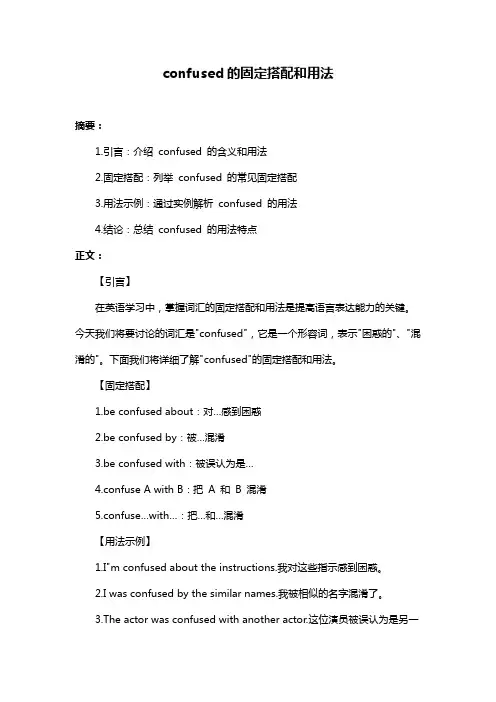
confused的固定搭配和用法摘要:1.引言:介绍confused 的含义和用法2.固定搭配:列举confused 的常见固定搭配3.用法示例:通过实例解析confused 的用法4.结论:总结confused 的用法特点正文:【引言】在英语学习中,掌握词汇的固定搭配和用法是提高语言表达能力的关键。
今天我们将要讨论的词汇是"confused",它是一个形容词,表示"困惑的"、"混淆的"。
下面我们将详细了解"confused"的固定搭配和用法。
【固定搭配】1.be confused about:对…感到困惑2.be confused by:被…混淆3.be confused with:被误认为是…4.confuse A with B:把A 和B 混淆5.confuse…with…:把…和…混淆【用法示例】1.I"m confused about the instructions.我对这些指示感到困惑。
2.I was confused by the similar names.我被相似的名字混淆了。
3.The actor was confused with another actor.这位演员被误认为是另一位演员。
4.Don"t confuse him with his brother.别把他和他哥哥混淆。
5.Some people confuse love with infatuation.有些人把爱和迷恋混淆。
【结论】"confused"是一个常用的形容词,表示"困惑的"、"混淆的"。
在英语表达中,它有许多固定搭配,如be confused about、be confused by、be confused with 等。
通过学习这些搭配,我们可以更准确地表达自己的想法,避免因混淆词汇而产生的误解。
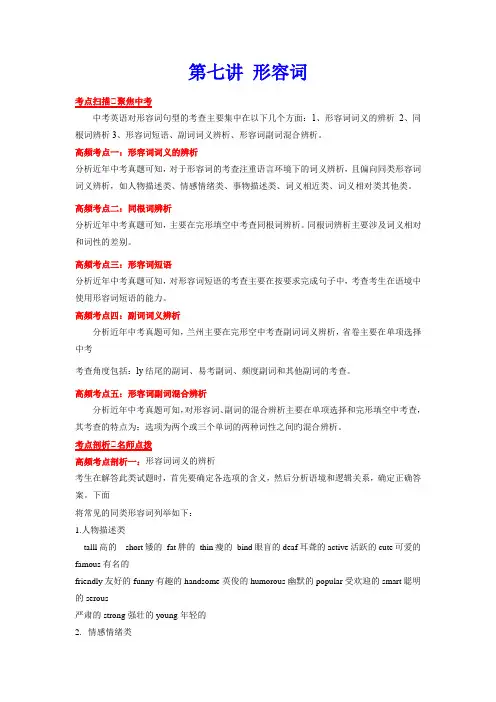
第七讲形容词考点扫描☆聚焦中考中考英语对形容词句型的考查主要集中在以下几个方面:1、形容词词义的辨析2、同根词辨析3、形容词短语、副词词义辨析、形容词副词混合辨析。
高频考点一:形容词词义的辨析分析近年中考真题可知,对于形容词的考査注重语言环境下的词义辨析,且偏向同类形容词词义辨析,如人物描述类、情感情绪类、事物描述类、词义相近类、词义相对类其他类。
高频考点二:同根词辨析分析近年中考真题可知,主要在完形填空中考查同根词辨析。
同根词辨析主要涉及词义相对和词性的差别。
高频考点三:形容词短语分析近年中考真题可知,对形容词短语的考查主要在按要求完成句子中,考查考生在语境中使用形容词短语的能力。
高频考点四:副词词义辨析分析近年中考真题可知,兰州主要在完形空中考查副词词义辨析,省卷主要在单项选择中考考查角度包括:ly结尾的副词、易考副词、频度副词和其他副词的考查。
高频考点五:形容词副词混合辨析分析近年中考真题可知,对形容词、副词的混合辨析主要在单项选择和完形填空中考查,其考查的特点为:选项为两个或三个单词的两种词性之间旳混合辨析。
考点剖析☆名师点拨高频考点剖析一:形容词词义的辨析考生在解答此类试题时,首先要确定各选项的含义,然后分析语境和逻辑关系,确定正确答案。
下面将常见的同类形容词列举如下:1.人物描述类talll高的short矮的fat胖的thin瘦的bind眼盲的deaf耳聋的active活跃的cute可爱的famous有名的friendly友好的funny有趣的handsome英俊的humorous幽默的popular受欢迎的smart聪明的serous严肃的strong强壮的young年轻的2.情感情绪类bored无聊的disappointed失望的excited兴奋的frightened害怕的happy开心的interested感兴趣的lonely孤独的nervous焦虑的;紧张的proud骄傲的,自豪的sad伤心的surprised惊讶的3.事物描述类worried担忧的available可利用的bad坏的boring无聊的different不同的fantastic极好的popular流行的special特别的useful有用的4.词义相近类Expensive与high:描述物品贵用expensive,描述物品价格(price)高用high;loney与alone描指述人感到孤独的用lonely(可作定语、表语和宾语补足语),描述人独自的用alone③sleepy与asleep:描述人瞌睡的用sleepy(作表语或前置定语),描述人睡着的状态用asleep(作表语或宾语补足语)。
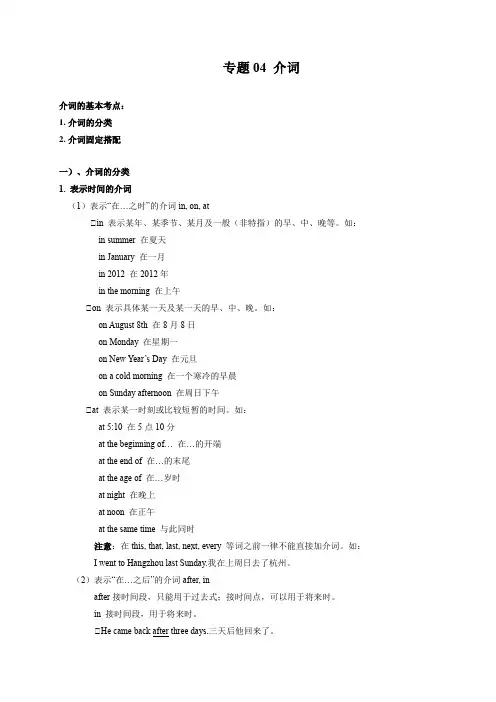
专题04 介词介词的基本考点:1.介词的分类2.介词固定搭配一)、介词的分类1. 表示时间的介词(1)表示“在…之时”的介词in, on, at①in 表示某年、某季节、某月及一般(非特指)的早、中、晚等。
如:in summer 在夏天in January 在一月in 2012 在2012年in the morning 在上午①on 表示具体某一天及某一天的早、中、晚。
如:on August 8th 在8月8日on Monday 在星期一on New Year’s Day 在元旦on a cold morning 在一个寒冷的早晨on Sunday afternoon 在周日下午①at 表示某一时刻或比较短暂的时间。
如:at 5:10 在5点10分at the beginning of… 在…的开端at the end of 在…的末尾at the age of 在…岁时at night 在晚上at noon 在正午at the same time 与此同时注意:在this, that, last, next, every 等词之前一律不能直接加介词。
如:I went to Hangzhou last Sunday.我在上周日去了杭州。
(2)表示“在…之后”的介词after, inafter接时间段,只能用于过去式;接时间点,可以用于将来时。
in 接时间段,用于将来时。
①He came back after three days.三天后他回来了。
①He will come here after four.4点后他要来这里。
①He will come back in a week.他会在一周以后回来。
(3)表示一段时间的介词for, since, by, from… to, until/till①for 表示一段时间。
可以指过去、现在或将来,着重说明“多久(how long)”。
如:My uncle has lived in Washington for more than two years.我的叔叔在华盛顿住了两年多。
介词的使用方法与常见搭配介词是英语语法中的重要部分,它用来表示名词、代词、动词和形容词之间的关系。
正确使用介词可以在表达中起到突出语义、加强修饰和衔接句子的作用。
本文将探讨介词的使用方法以及常见的搭配。
一、介词的基本概念与用法介词是一类没有词义却在句中有重要作用的词语,它通常用来连接名词或代词与其他词语,以表达它们之间的关系。
介词一般位于名词或代词之前,并且与其构成短语。
常见的英语介词包括"in"、"at"、"on"、"for"、"with"等。
二、常见介词的搭配用法1. "in"的常见搭配- 概括空间、地点:in a room(在房间里)、in the garden(在花园里)- 指在某个时段内:in the morning(在早晨)、in winter(在冬天)- 表示在某个国家或地区: in China(在中国)、in Europe(在欧洲)2. "at"的常见搭配- 表示在某个具体位置:at the station(在车站)、at the table(在桌子旁)- 表示在某个时间点:at noon(在中午)、at night(在晚上)- 表示某种状态:at ease(自在)、at risk(处于风险中)3. "on"的常见搭配- 指在某个表面或物体上:on the table(在桌子上)、on the wall (在墙上)- 表示在某个具体的日期:on Monday(在星期一)、on April 1st (在4月1日)- 表示以某种方式传播:on television(在电视上)、on the internet (在互联网上)4. "for"的常见搭配- 表示某种目的或目标:study for an exam(为考试而学习)、work for a company(为公司工作)- 表示某个时间段:for a week(一个星期)、for two hours(两个小时)- 表示提供给某人:buy a gift for my friend(给我的朋友买个礼物)5. "with"的常见搭配- 表示陪同或伴随:go shopping with my sister(和我妹妹一起去购物)、have dinner with friends(和朋友们一起吃饭)- 表示使用某物:write with a pen(用钢笔写字)、cut with a knife (用刀切割)- 表示具备某种特征或状态:be happy with the result(对结果感到满意)、be familiar with the city(对这个城市熟悉)三、介词的常见错误用法在使用介词时,有几种常见的错误用法需要避免。
popular的用法和搭配Popular是一个常用的形容词,可以用来描述事物的受欢迎程度或广泛程度。
在各种不同的语境中,popular都有不同的搭配和用法。
以下是popular的一些常见用法和搭配:1. Popular with/ among + 人(表示人喜欢事物):- This movie is popular with teenagers. (这部电影受到青少年的喜爱。
)- She is very popular among her classmates. (她在同学中非常受欢迎。
)- This restaurant is popular with locals. (这家餐厅受到当地人的喜爱。
)2. Popular for + 事物(表示事物因其中一种特点而受欢迎):- This city is popular for its beautiful beaches. (这座城市因其美丽的海滩而受欢迎。
)- The artist is popular for his unique painting style. (这位艺术家因其独特的绘画风格而受欢迎。
)3. Be popular among/with + 群体(表示群体喜欢事物):- This type of music is popular among young people. (这种音乐在年轻人中很受欢迎。
)- This brand of clothing is popular with fashion enthusiasts. (这个服装品牌在时尚爱好者中很受欢迎。
)4. Be popular for + 动词-ing(表示其中一种行为或特质使人受欢迎):- He is popular for making people laugh. (他以让人们笑起来而受欢迎。
)- This book is popular for its inspiring storytelling. (这本书因其鼓舞人心的故事而受欢迎。
高中英语词组固定搭配(珍藏版)英语一、接不定式(而不接动名词)作宾语的24个常用动词affordtodoth.负担得起做某事agreetodoth.同意做某事arrangetodoth.安排做某事aktodoth.要求做某事begtodoth.请求做某事caretodoth.想要做某事chooetodoth.决定做某事decidetodoth.决定做某事demandtodoth.要求做某事determinetodoth.决心做某事e某pecttodoth.期待做某事feartodoth.害怕做某事helptodoth.帮助做某事hopetodoth.希望做某事learntodoth.学习做某事managetodoth.设法做某事offertodoth.主动提出做某事plantodoth.计划做某事preparetodoth.准备做某事pretendtodoth.假装做某事promietodoth.答应做某事refuetodoth.拒绝做某事wanttodoth.想要做某事wihtodoth.希望做某事注:有些不及物动词后习惯上也接不定式,不接动名词:aimtodoth.打算做某事failtodoth.未能做某事longtodoth.渴望做某事happentodoth.碰巧做某事heitatetodoth.犹豫做某事truggletodoth.努力做某事二、接不定式作宾补的36个常用动词advieb.todoth.建议某人做某事allowb.todoth.允许某人做某事akb.todoth.请(叫)某人做某事bearb.todoth.忍受某人做某事begb.todoth.请求某人做某事caueb.todoth.导致某人做某事electb.todoth.选举某人做某事encourageb.todoth.鼓励某人做某事e某pectb.todoth.期望某人做某事forbidb.todoth.禁止某人做某事forceb.todoth.强迫某人做某事getb.todoth.使(要)某人做某事hateb.todoth.讨厌某人做某事helpb.todoth.帮助某人做某事intendb.todoth.打算要某人做某事inviteb.todoth.邀请某人做某事leaveb.todoth.留下某人做某事likeb.todoth.喜欢某人做某事meanb.todoth.打算要某人做某事needb.todoth.需要某人做某事obligeb.todoth.迫使某人做某事orderb.todoth.命令某人做某事permitb.todoth.允许某人做某事peruadeb.todoth.说服某人做某事preferb.todoth.宁愿某人做某事requetb.todoth.要求某人做某事remindb.todoth.提醒某人做某事teachb.todoth.教某人做某事tellb.todoth.告诉某人做某事trainb.todoth.训练某人做某事troubleb.todoth.麻烦某人做某事wantb.todoth.想要某人做某事warnb.todoth.警告某人做某事wihb.todoth.希望某人做某事三、接动名词(不接不定式)作宾语的34个常用动词admitdoingth.承认做某事adviedoingth.建议做某事allowdoingth.允许做某事appreciatedoingth.感激做某事avoiddoingth.避免做某事coniderdoingth.考虑做某事delaydoingth.推迟做某事denydoingth.否认做某事dicudoingth.讨论做某事dilikedoingth.不喜欢做某事enjoydoingth.喜爱做某事ecapedoingth.逃脱做某事e某cuedoingth.原谅做某事fancydoingth.设想做某事finihdoingth.完成做某事forbiddoingth.禁止做某事forgivedoingth.原谅做某事giveupdoingth.放弃做某事imaginedoingth.想象做某事keepdoingth.保持做某事mentiondoingth.提及做某事minddoingth.介意做某事midoingth.错过做某事pardondoingth.原谅做某事英语permitdoingth.允许做某事practicedoingth.练习做某事preventdoingth.阻止做某事prohibitdoingth.禁止做某事putoffdoingth.推迟做某事reportdoingth.报告做某事rikdoingth.冒险做某事topdoingth.停止做某事uggetdoingth.建议做某事undertanddoingth.理解做某事四、1.接现在分词作宾补的20个常用动词bringb.doingth.引起某人做某事catchb.doingth.碰上(撞上)某人做某事dicoverb.doingth.发现某人做某事feelb.doingth.感觉某人做某事findb.doingth.碰上(撞上)某人做某事getb.doingth.使某人做某事haveb.doingth.使某人做某事hearb.doingth.听见某人做某事keepb.doingth.使某人不停地做某事litentob.doingth.听某人做某事lookatb.doingth.看着某人做某事noticeb.doingth.注意到某人做某事oberveb.doingth.观察某人做某事preventb.doingth.阻止某人做某事eeb.doingth.看见某人做某事endb.doingth.使某人(突然)做某事etb.doingth.使(引起)某人做某事tartb.doingth.使某人开始做某事topb.doingth.阻止某人做某事watchb.doingth.观看某人做某事2.接动词原形作宾补的11个常用动词feelb.doth.感觉某人做某事haveb.doth.使某人做某事hearb.doth.听见某人做某事letb.doth.让某人做某事litentob.doth.听着某人做某事lookatb.doth.看着某人做某事makeb.doth.使某人做某事noticeb.doth.注意某人做某事oberveb.doth.观察某人做某事eeb.doth.看见某人做某事watchb.doth.观察某人做某事五、接不定式或动名词作宾语意思相同的12个动词liketodoth/likedoingth.喜欢做某事lovetodoth/lovedoingth.喜欢做某事hatetodoth/hatedoingth.憎恨做某事prefertodoth/preferdoingth.宁可做某事begintodoth/begindoingth.开始做某事tarttodoth/tartdoingth.开始做某事continuetodoth/continuedoingth.继续做某事can’tbeartodoth/can’tbeardo ingth.不能忍受做某事bothertodoth/botherdoingth.麻烦做某事intendtodoth/intenddoingth.想要做某事attempttodoth/attemptdoingth.试图做某事ceaetodoth/ceaedoingth.停止做某事六、接不定式或动名词作宾语意思不同的7个动词(1)remembertodoth.记住要做某事rememberdoingth.记住曾做过某事(2)forgettodoth.忘记要做某事forgetdoingth.忘记曾做过某事(3)regrettodoth.后悔(遗憾)要做某事regretdoingth.后悔(遗憾)曾做过某事(4)trytodoth.设法要做某事trydoingth.做某事试试看有何效果(5)meantodoth.打算做某事meandoingth.意味着做某事(6)can’thelptodoth.不能帮助做某事can’thelpdoingth.禁不住做某事(7)goontodoth.做完某事后接着做另一事goondoingth.继续做一直在做的事注:toptodoth.与topdoingth.也不同,前者指停下来去做某事,后者指停止正在做的事,但toptodoth.中的不定式不是宾语,是目的状语。
▲be afraid of 害怕,担心Are you afraid of dogs? 你害狗吗?There’s nothing to be afraid of.没什么可害怕的。
He was afraid of failing in the exam. 他担心考试会不及格。
▲be ashamed of 对(做)……感到羞愧(惭愧)You really ought to be ashamed of that. 你实在应该对此感到惭愧。
He is ashamed of his failure [having failed]. 他对自己的失败感到羞惭。
【注】比较以下同义句型:I am ashamed of that.=I am ashamed of myself for that. 我对此感到羞愧。
He is ashamed of being poor.=He is ashamed of himself for being poor. 他因为穷而感到羞惭▲be aware of 觉察到,意识到Are you aware of the time? 你知道是什么时候了吗?He was not aware of having done wrong. 他还没有意识到自己做错了。
▲be capable of 能够做,可以You are capable of better work than this. 你能比这做得更好。
Show me what you are capable of. 让我看看你有什么本事。
【注】表示能做某事,英语习惯上不说 be capable to do sth,而说 be capable of doing sth。
如:He is capable of finishing the work in an hour. 他能在一小时内完成这工作。
▲be careful of 当心,注意Be careful of the dog; it sometimes bites people. 留心那条狗,有时候咬人。
be动词与副词的搭配用法英语中,be动词(am、is、are、was、were)在句子中起到连接主语和表语的作用。
而副词则用来修饰动词、形容词、句子等。
正确的搭配和使用be动词与副词,可以使句子更加准确和流畅。
本文将介绍一些常见的be动词与副词的搭配用法。
一、肯定句中的be动词与副词搭配用法1. 一般现在时:am/is/are + 副词例如:- He is always punctual for work.- They are often late for class.2. 一般过去时:was/were + 副词例如:- She was extremely tired after the long journey.- We were very excited about the news.3. 一般将来时:will be + 副词例如:- I will definitely be there on time.- They will probably be late for the meeting.二、否定句中的be动词与副词搭配用法1. 一般现在时:am/is/are not + 副词例如:- He is not always available for meetings.- They are not often interested in sports.2. 一般过去时:was/were not + 副词例如:- She was not particularly happy with the results. - We were not really surprised by their decision.3. 一般将来时:will not be + 副词例如:- I will not be easily persuaded by his arguments. - They will not be actively involved in the project.三、疑问句中的be动词与副词搭配用法1. 一般现在时:am/is/are + 主语 + 副词例如:- Is he always so talkative?- Are they often this noisy?2. 一般过去时:was/were + 主语 + 副词例如:- Was she really that late for the appointment?- Were they actually at the party?3. 一般将来时:will + 主语 + be + 副词例如:- Will you definitely be there on time?- Will they possibly be finished by tomorrow?四、特殊句型中的be动词与副词搭配用法1. There be句型:There is/are + 副词例如:- There is always a lot of traffic during rush hour. - There are often many tourists in this area.2. 进行时态:am/is/are + 副词 + 现在分词例如:- He is currently working on a new project.- They are eagerly anticipating the results.3. 完成时态:has/have been + 副词 + 过去分词例如:- She has always been fascinated by art.- We have never been disappointed with their service.总结一下,be动词与副词的搭配用法可以根据句子的时态和语境来确定。
▲be angry with 对……生气
He was angry with his wife. 他对他妻子很生气。
The teacher was angry with me when I was late. 我迟到时老师对我很生气。
【注】表示对某人生气,用be angry with比用be angry at 常用。
有人认为:用 with 表示心中感到生气,而用 at 则表示怒气流露于外表;也有人认为用介词 at 为口语或非正式文体等。
不过值得注意的是,不要按汉语意思说 be angry to sb。
▲be bored with 对……厌烦
I am bored with this subject, anyway. 不管怎样,我对这个问题感到厌烦。
I got the impression that he was bored with his job. 我得到的印象是他对工作感到厌倦。
▲be busy with 忙于
He’s busy with his homework.他正忙着做家庭作业。
He was busy day and night with conferences. 他日夜忙于与人会谈。
▲be careful with 注意,当心,小心
Be careful with that dress; it rips easily. 小心那件连衣裙,很容易破。
These glasses are very expensive so please be careful with them. 这些玻璃杯十分昂贵,因此请小心些。
▲be concerned with 与……有关;涉及;关心,关注
The meeting was concerned with foreign trade. 这次会议和外贸有关。
This chapter is concerned with space flight. 这一章是有关太空飞行的。
This company is more concerned with quality than with quantity. 这家公司对质量比对产量更关心。
He is primarily concerned with his work, not his family. 他第一关心的是他的工作而不是他的家庭。
▲be content with对……满意
Are you content with your work? 你对你的工作满意吗?
We are not content with the present achievements. 我们不满足于目前的成就。
▲be delighted with对……感到高兴
They were delighted with the result. 他们对这结果感到很高兴。
The boy was delighted with his new knife. He had been wanting one for a long time. 男孩对新小刀很高兴。
他早就想要一把了。
▲be disappointed with 对……感到失望
I was disappointed with his performance. 他的表现令我失望。
I am very disappointed with my new bike. 我对我的新自行车感到很失望。
【注】disappointed后可接多个介词,其区别大致为:表示对某人感到失望,一般用介词 with 或 in;表示对某一行为感到失望,一般用介词 at 或about;表示对某一事实或情况感到失望,一般用介词 with, at或in。
▲be familiar with 熟悉;与……关系友好(或过分友好)
We are familiar with his character. 我们了解他的性格。
He’s familiar with his boss.他与他的老板关系很友好。
He is too familiar with my wife. 他对我妻子太随便。
【注】比较下面两个句子:
I am not very familiar with botanical names. 我不太熟悉植物学方面的名称。
Botanical names are not very familiar to me. 植物学方面的名称我不太熟悉。
▲be honest with 对……真诚(坦诚)
Let us be honest with each other. 让我们真诚相待。
I must be honest with you. 我一定要与你坦诚相见。
▲be ill with患……病
She is very ill with a fever. 她在发烧,病得很厉害。
The boss has been ill with flu this week. 老板因患流感病了一个星期。
▲be patient with 对……有耐心(容忍)
You should be more patient with others. 你应该多容忍他人一些。
We must be patient with children. 我们对孩子必须要有耐心。
▲be pleased with 对……很满意(高兴)
I’m pleased with your work.我对你的工作很满意。
They were pleased with this painting. 他们对这幅画很满意。
▲be popular with 受……欢迎
I’m not very popular with the boss at the moment.我现在不称老板的心。
She is a lively child and popular with everyone. 她是个活泼的孩子,大家都喜欢她。
【注】若其后接的是一个复数名词或表示复数意义的集合名词,则可用介词among代替with。
如:
The teacher is very popular with [among] his students. 这位老师很受学生欢迎。
He is popular among men, though not, perhaps, with ladies. 他很受男士们的欢迎,虽然也许不一定讨女士们的喜欢。
▲be satisfied with对……感到满意
I was not satisfied with the result. 我对那个结果感到不满意。
He is quite satisfied with his lot. 他对自己的命运十分满足。
▲be strict with对……严厉的(严格的)
First of all, you must be strict with yourself. 首先,你必须要严以律已。
The teacher is strict with his students. 这老师对他的学生很严格。
【注】表示对某人严格,strict后通常接介词with;若指对某事严格,则strict后通常用介词in,有时也用介词on或about。
如:
He’s strict in his work.他对工作要求很严格。
This company is very strict about punctuality. 这个公司要求严格守时。
The government is very strict on the exporting of gold. 政府对黄金出口严格控制。